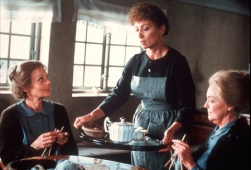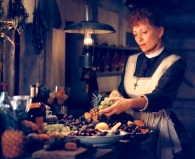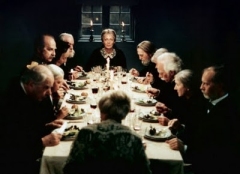
“Babette’s Feast” (1987) was one of the first ever DVDs I acquired for my movie collection. This film has a unique combination of being an “indie-foreign-foodie” category. It is based on a Isak Dinesen (the nom de plume of Karen Blixen, of “Out Of Africa” fame) short story. I’ve never seen a film that more perfectly communicates how excellent food effects humans: the artistry required to do it well, the generosity of making it, and how food not only satisfies and pleases, but may change one’s very outlook and attitude for life itself.

The story takes place in Denmark, the Jutland coast, 1871. Two sisters, Martine and Philippa, are aging spinsters in a remote Lutheran village. The sisters spend most of their time (and money) doing good works for members of their dwindling and aging congregation of their father (now deceased) who was once minister.
Flashback to 40 years before. Martine and Philippa are young and beautiful, their father alive, and adamant about staving off all male attention to his daughters. The minister easily squashes the amorous advances from the young men in his congregation, but challenges arise from the outside world. The first is a young ne’er-do-well lieutenant, banished to the Jutland coast to get his act together. Once Lieutenant Lorens Löwenhielm claps his eyes on Martine, he decides that she is the focus for a new life, one free from his child-like behavior with this beautiful angel by his side. By subtle means, the minister manages to unsettle the lieutenant to the point that he sees Martine as a lost cause and then throws himself into a military career, giving up on true love…forever.
The second challenge takes the form of famed French opera star, Achille Papin, who craving solitude and silence, is visiting the Jutland coast. The silence only succeeds to point out to Papin that he is at to the end of his career. He happens to hear Philippa sing, and imagines tutoring not only a gifted protegé, but perhaps a lover as well. At a voice lesson the two practice Mozart’s Don Giovanni, which ‘tho classical to modern times, has enough “joie de vivre” to seems like porn to 19thC. Lutherans. Again with subtle pressure from the father, he compels Philippa to ask to stop voice lessons with Papin. […and the relish in which the minister does so…condemming as he has, both daughters to a lonely spinsterhood, far from their true capabilities and destinies, makes this viewer hate him not just a little.]
Back to 1871, on a stormy night, the sisters receive a visitor: a woman escaping the ravages of the French Revolution. She carries a letter from none other than Achille Papin, begging the sisters to take this woman into their service. He explains that General Gallifet has executed her husband and son, and that she herself has narrowly escaped with her life, but has lost everything. She is Babette Hersant, who Papin writes, “knows how to cook.”

For 14 years, Babette is a servant to the two sisters. In that time, her Danish improves to the point that she has confidence to “tame” not only local merchants but also the constantly bickering congregation. Then, comes a communication from France informing Babette that she has won the annual lottery she has entered since her departure, to the sum of 10,000 francs! Babette asks the sisters to allow her to make a French meal for the 100th anniversary of the minister’s birth. As Babette has never asked for anything before, the sisters agree, but as materials start to arrive, they have second thoughts: live quails; a green turtle, WINE…what will all this do to the congregation?!!! Martine has a dream that the congregation ends up dead…or worse…dead drunk, because of the meal! Martine expresses her doubts to the congregation and they, comparing Babette’s meal to a “witches Sabbat” assure her that they will ignore the food as “no importance.”
A surprise, last-minute guest of the meal is non other than (now) General Löwenhielm, who acts as a kind of interpreter of how precious the meal truly is, to not only the congregation….but to the film viewer. His discoveries, observations, and amazements are lost on the other diners as they reply to his sophisticated exclamations with comments about the weather.
Babette’s Feast:
Green Turtle Soup (wine-Amontillado) [Green Turtle Soup served with turtle eggs]
Blinis Demidoff (wine-Veuve Clicquot 1860 Champangne) [a kind of pancake covered topped with sour cream, caviar and shallots]
Cailles en Sarcrphage (wine-Clos de Vouget 1845) [Babette’s’ own creation: a quail, stuffed with pate and truffle, baked in a puff pastry]
Salad of Belgian Endive with vinaigrette
Rum Cake with Candied Fruit, Cheese, and Fresh Fruit, for dessert
Coffee and Port
During the course of this meal, it is revealed that Babette was head-chef at Paris’s famed “Cafe Anglais” and was most esteemed by the very General Gallifet who condemned her. Even more, Gallifet was quoted to say of Babette:
“This chef had the ability to transform a dinner into a kind of love affair, that made no distinction between the bodily appetite and the spiritual.”
One thing is clear: the special meal opens the hearts of the congregation to the point that past animosities are understood, forgiven, and forgotten, as…
“Mercy and truth have met together. Righteousness and bliss shall kiss one another.”
[The true generosity of Babette is only revealed in the last frames of the film. “Babette’s Feast” touches on the ability of the artist to change the perception of the world by giving of their best, the importance of service and to return one’s debt to benefactors. Oddly, there is also a harmonious meld of extreme religious belief with the sensual appetite in “Babette’s Feast.”
I recently posted a Tweet stating that if asked what I believe in, I would say, “A good sandwich.” I didn’t mean to appear casual or as caustic by this. I simply do not know what power(s) govern my life or the lives of others. What I cannot deny is that…once and a while…the sporadic generosity of the creator/universe/powers-that-be, present itself in a way to what both believers and the unbelievers may not contest,

“Never would you give a stone, to the child who begs for bread.”]































































